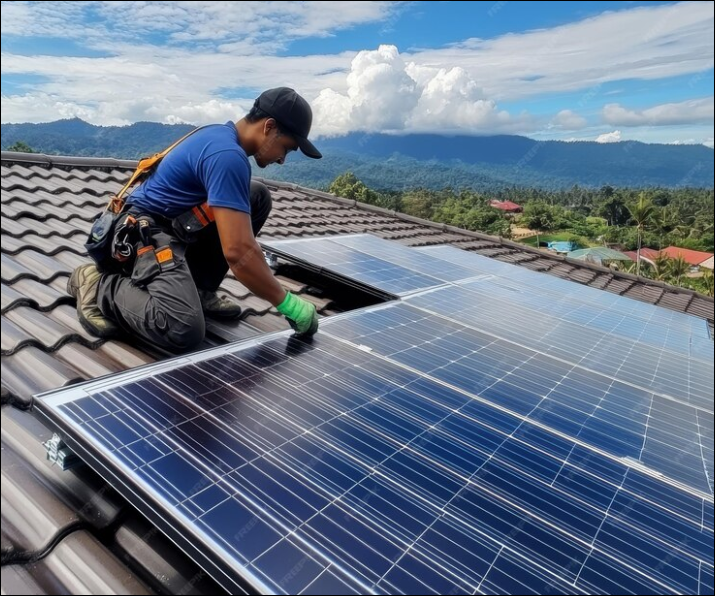As the demand for solar energy continues to rise, homeowners are increasingly looking to maximize the return on their solar investments. The roof on which solar panels are installed plays a critical role in their efficiency, longevity, and overall performance. A well-matched roofing material ensures your solar panels function optimally while extending their lifespan. At Tried and True Roofing, we understand that choosing the right roof for your solar panels is just as important as selecting the solar system itself. Below, we explore the best types of roofs for solar panels, highlighting durability, weight capacity, and reflectivity.
Long-Lasting Roofing Materials for Solar Panel Installations
One of the primary considerations when installing solar panels is the longevity of the roofing material. Solar panels have an average lifespan of 25 years, and it’s crucial that your roof lasts as long as, or longer than, the panels. Installing solar on a roof that needs frequent repairs or replacement can be costly, as it may require removing and reinstalling the solar panels.
The best Denver roofing materials for solar panels offer both durability and long-term performance. Metal roofs, for example, can last up to 70 years, providing a reliable foundation for solar panel installations. In contrast, asphalt shingles typically need replacing every 15-20 years, potentially adding to the overall cost of your solar project.
Key Considerations:
- Metal Roofs: With a lifespan of 40-70 years, metal roofs are highly durable and require little maintenance.
- Asphalt Shingles: Affordable but less durable, with a lifespan of around 20 years.
- Tile Roofs: Clay and concrete tiles are durable but may need structural reinforcement due to their weight.
Load-Bearing Capacity and Roofing Weight for Solar Panels
Solar panels are heavy, and their mounting systems add significant weight to your roof. A typical home solar installation can weigh several hundred pounds, depending on the number of panels. As a result, it’s crucial that the roof can support this additional load without compromising structural integrity.
Certain roofing materials, such as clay or concrete tiles, can be quite heavy on their own, requiring extra structural support for both the tiles and the solar panels. Metal roofs, on the other hand, are lightweight and have a high load-bearing capacity, making them an ideal choice for solar installations. Additionally, a roofing material that is too heavy, like clay tiles, may not be suitable for homes in regions with frequent snow accumulation or harsh weather.
Roofing Material and Weight:
- Metal Roofs: Lightweight yet strong enough to support solar panels without requiring additional reinforcement.
- Clay and Concrete Tiles: Heavy and may necessitate extra support for both the roofing material and the solar panels.
- Asphalt Shingles: Lightweight but may require additional structural work depending on the home’s age and construction.
High Solar Reflectivity for Enhanced Solar Panel Efficiency
While solar panels work optimally at moderate temperatures, excess heat can reduce their efficiency. When temperatures exceed 77°F, solar panels start losing efficiency at a rate of about 0.45% per degree. Therefore, choosing a roofing material with high solar reflectivity can help maintain a cooler roof surface, preventing thermal stress on your solar panels and maintaining high energy output.
Reflective roofing materials like metal can reduce the roof’s surface temperature, enhancing both the efficiency of your solar panels and the overall energy efficiency of your home. On the other hand, roofing materials like asphalt shingles tend to absorb heat, which can negatively impact the panels’ performance, particularly during the hot summer months.
Benefits of High-Reflectivity Roofing:
- Metal Roofs: Known for their solar reflectivity, metal roofs help reduce surface temperatures by up to 55°F, maximizing solar panel efficiency.
- Asphalt Shingles: Absorb heat, making them less ideal for maintaining the optimal temperature for solar panels.
- Tile Roofs: Depending on the finish, clay or concrete tiles may offer moderate reflectivity.
Conclusion: Choose the Right Roof for Your Solar Panels
When considering solar panels, it’s essential to select a roofing material that aligns with your long-term energy goals. The right roofing material not only supports the weight and structure of solar panels but also enhances their efficiency and extends their lifespan. Tried and True Roofing provides expert consultation on choosing the best roofing solution for solar installations, ensuring that your home is ready for a sustainable, energy-efficient future.
Among the best options, metal roofing stands out as the optimal choice for solar panels, offering durability, high load-bearing capacity, and solar reflectivity. If you’re exploring solar energy options and need advice on roofing in Denver, contact us for professional guidance. We have extensive experience with solar panel installations and can recommend roofing materials that ensure you get the most out of your solar investment.
Benefits of a Professional Installation:
- Durability: A long-lasting roof means fewer interruptions and lower overall costs for solar maintenance.
- Efficiency: A well-matched roof and solar system maximize energy savings over time.
- Support: Professional roofers in Denver, such as Tried and True Roofing, can assess your roof’s condition, ensure it’s compatible with solar panels, and provide expert installation services.
Investing in the right roofing material now can save you time and money in the long run, allowing your solar panels to operate at peak performance for years to come.


